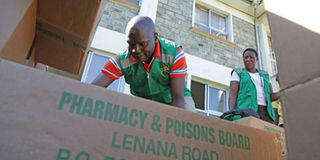Regulator closes 161 illegal chemists in Western crackdown

Officers of the Pharmacy and Poisons Board inspect medicine seized during a crackdown in Kisumu County on December 20, 2019. In an operation in Western that began on February 2, 2020, the board shut down 161 illegal chemists. PHOTO | ONDARI OGEGA | NATION MEDIA GROUP
What you need to know:
- Dr. Dominic Kariuki, the PPB's Head of Good Distribution Practices and Ports of Entry, said 56 were closed in Kakamega, 45 in Busia, 34 in Bungoma and 26 in Vihiga.
- Dr Kariuki told journalists on Friday that the crackdown involving police officers augmented routine inspections by the board’s regional inspectors.
- The official reported that stock in the outlets was seized for safe disposal and their owners arrested and charged with various offences.
The Pharmacy and Poisons Board (PPB) has shut down 161 illegal chemists in the Western region in a crackdown that began on Monday.
Dr Dominic Kariuki, the PPB's Head of Good Distribution Practices and Ports of Entry, said 56 were closed in Kakamega, 45 in Busia, 34 in Bungoma and 26 in Vihiga.
Dr Kariuki told journalists on Friday that the crackdown involving police officers augmented routine inspections by the board’s regional inspectors.
“The list of targeted illegal chemists was [created following] mapping by the Western regional commissioner and PPB officers. The non-compliant outlets were identified from the PPB's online database,” he said.
He said information about the outlets was shared with police commanders for action.
OWNERS ARRESTED
The official reported that stock in the outlets was seized for safe disposal and their owners arrested and charged with various offences.
He said some of the owners opened pharmacies without being registered, contrary to Section 19 of the Pharmacy and Poisons Act.
“Of the 50 cases that have so far been taken to court, the accused persons pleaded guilty and were fined between Sh5,000 and Sh20,000,” he said.
He said those who denied the charges were released on Sh200,000 bond.
CHALLENGES
Dr Kariuki further reported that of those apprehended, six were repeat offenders who likely returned to the illegal business due to low or non-deterrent fines.
“We request the courts to enhance fines imposed on those found guilty of malpractices to act as a deterrent as they are a danger to public health,” he said.
Dr Kariuki also spoke of challenges including supplies to illegal chemists by licensed wholesalers of drugs, as evidenced in the invoices they collected during the inspection.
The officials also noted the challenge of absentee superintendents, a circumstance which allows unqualified personnel to run licensed pharmacies.
“Professional identified as engaging in these illegalities have been summoned for disciplinary actions,” he said.
He added, "PPB inspectors have noted with concern the presence of unmarked chemists which is key pointer to illegal pharmaceutical outlets. The public should report such premises to PPB inspectors for immediate action."
GUIDELINES
Dr Kariuki said the PPB recently launched guidelines for good distribution practices and transportation of pharmaceuticals for safe disposal, which are available to the public.
“All those who wish to engage in pharmacy are requested to notify the PPB three months in advance so we can advise them on the suitability of premises and the requirements,” he said.
He added that all pharmacies and hospitals with expired drugs were directed to store them safely and contact the PPB's regional inspectors for safe disposal.
“We advise the public to use health safety codes displayed in registered pharmacy outlets to verify the legality of premises,” he also said.





